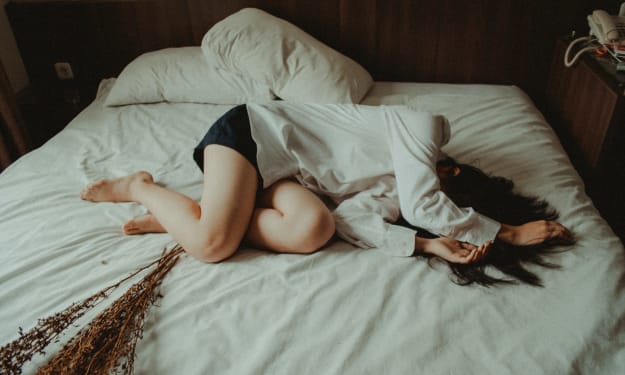The Two-Way Street
Appearance and Mental Health

In a world bombarded with airbrushed images and unrealistic beauty standards, it's no surprise that our appearance can significantly impact our mental health. But the relationship goes beyond feeling good (or bad) about how we look in the mirror. It's a complex interplay between self-perception, social interactions, and societal pressures.
This article explores the multifaceted connection between appearance and mental well-being. We'll delve into the negative effects of negative body image, the confidence boost that comes with feeling good about ourselves, and the importance of challenging unrealistic beauty standards.
The Downward Spiral: How Negative Body Image Affects Mental Health
Feeling dissatisfied with our appearance can trigger a cascade of negative emotions and behaviors. Here are some key ways a negative body image can impact mental health:
Low Self-Esteem: When we constantly critique our looks, it chips away at our self-worth. This can lead to feelings of inadequacy, insecurity, and difficulty accepting ourselves.
Social Anxiety: The fear of being judged based on appearance can lead to social anxiety. People with negative body image might avoid social situations, hindering their ability to connect with others.
Depression: Chronic dissatisfaction with one's body can contribute to feelings of hopelessness and depression.
Eating Disorders: In some cases, negative body image manifests in unhealthy eating behaviors like restricting food intake, purging, or binge eating, leading to eating disorders.
Body Dysmorphic Disorder (BDD): This is a severe mental health condition where a person becomes fixated on perceived flaws in their appearance, even if they are minor or undetectable to others.
These are just some of the ways negative body image can negatively impact mental health. It's a significant issue,especially for teenagers and young adults who are grappling with self-discovery and societal pressures.
The Confidence Boost: How Feeling Good About Ourselves Makes a Difference
On the other side of the coin, feeling comfortable and confident in our skin has a positive impact on mental well-being.Here's how:
Increased Self-Esteem: When we feel good about how we look, it can boost our self-confidence and overall self-worth. This can lead to a more positive outlook and a willingness to take risks.
Improved Social Interactions: Feeling good about ourselves makes us more likely to engage with others, fostering stronger social connections.
Stress Reduction: When we don't dwell on perceived flaws, it reduces overall stress levels, leading to a greater sense of well-being.
Motivation for Healthy Habits: Feeling good about ourselves can motivate us to make healthy choices regarding diet and exercise, further improving our physical and mental health.
It's important to note that feeling good about ourselves isn't solely dependent on physical appearance. However, positive self-image can be a powerful tool in navigating the challenges of life.
Beyond the Mirror: Challenging Unrealistic Beauty Standards
The media, social media, and even the fashion industry bombard us with narrow and unrealistic beauty standards. These portrayals often don't reflect the diversity of human bodies, creating a sense of inadequacy in many people. Here's how we can challenge these unrealistic standards:
Media Literacy: Educating ourselves and others about how images are manipulated in media can help us distance ourselves from unrealistic beauty ideals.
Body Positivity Movement: Embracing the "body positive" movement, which celebrates body diversity and self-acceptance, can help counteract unrealistic beauty standards.
Focus on Inner Beauty: Shifting the focus from purely physical appearance to inner qualities like kindness,intelligence, and humor promotes a more holistic sense of beauty.
By actively challenging unrealistic beauty standards, we can create a more inclusive environment where everyone feels valued for who they are, not just how they look.
Striking the Balance: Self-Care for Positive Body Image
Here are some tips for cultivating a positive body image and a healthy relationship with your appearance:
Practice Self-Compassion: Treat yourself with kindness and understanding. Instead of harsh self-criticism, focus on appreciating your body for all it does.
Focus on Health: Aim to feel good by adopting healthy habits like eating nutritious foods and getting regular exercise. Focus on how these choices make you feel, rather than just weight loss.
Surround Yourself with Positive Influences: Spend time with people who appreciate you for who you are and celebrate your unique qualities.
Limit Media Consumption: Be mindful of the media you consume and unfollow accounts that promote unrealistic beauty standards.
Seek Professional Help: If negative body image is significantly impacting your life, consider seeking help from a therapist who can help you develop a healthier self-image.
Remember: There is no single definition of beauty. Developing a positive body image is a journey, not a destination. Be patient with yourself and give yourself grace.
About the Creator
Morgan Elizabeth
Hello, there! I'm 23, a mom to be of 4 and a cat mom. I'm also a student at the University of Maryland pursuing a degree in English. I have a lot of hobbies, including writing, painting, cat training, and reading.






Comments
There are no comments for this story
Be the first to respond and start the conversation.